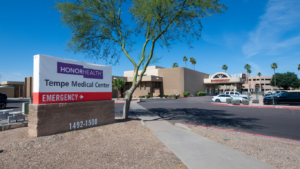Yael Eckstein, president and CEO of the International Fellowship of Christians and Jews (also referred to as IFCJ or The Fellowship), oversees all ministry programs and serves as the international spokesperson for the organization.
Prior to her present duties, Yael Eckstein served as Global Executive Vice President, Senior Vice President, and Director of Program Development and Ministry Outreach. Based in Israel with her husband and their four children, Yael is a published writer and a respected social services professional.
Yael Eckstein has contributed to The Jerusalem Post, The Times of Israel, and other publications, and is the author of three books: Generation to Generation: Passing on a Legacy of Faith to Our Children, Holy Land Reflections: A Collection of Inspirational Insights from Israel, and Spiritual Cooking with Yael. In addition, her insights into life in Israel, the Jewish faith, and Jewish-Christian relations can be heard on The Fellowship’s radio programs and her podcasts.
Yael Eckstein has partnered with other global organizations, appeared on national television, and visited with U.S. and world leaders on issues of shared concern. She has been a featured guest on CBN’s The 700 Club with Gordon Robertson, and she served on a Religious Liberty Panel on Capitol Hill in May 2015 in Washington, D.C., discussing religious persecution in the Middle East. She was also featured as the cover story of Nashim (Women) magazine in May 2015. Her influence as one of the young leaders in Israel has been recognized with her inclusion in The Jerusalem Post’s 50 Most Influential Jews of 2020 and 2021, and The Algemeiner’s Jewish 100 of 2019. She was named a winner in the 10th Annual 2022 CEO World Awards®, and received The Jerusalem Post’s 2023 Humanitarian Award.
Born in Evanston, Illinois, outside of Chicago, and well-educated at both American and Israeli institutions – including biblical studies at Torat Chesed Seminary in Israel, Jewish and sociology studies at Queens College in New York, and additional study at Hebrew University in Jerusalem – Yael Eckstein has also been a Hebrew and Jewish Studies teacher in the United States.
In this interview, host Yael Eckstein engages in a conversation with legendary singer, songwriter, and friend of Israel, Pat Boone. The focus of the interview is on the 40th anniversary of the International Fellowship of Christians and Jews and Pat Boone’s significant role in helping launch the organization onto the national stage. Yael and Pat discuss the special bond between Fellowship Founder Rabbi Yechiel Eckstein and Pat, which dates back to early 1992 when they collaborated on a program to support the freeing and transportation of Russian Jews to Israel. Pat’s immediate response and the overwhelming support from the Christian community laid the foundation for a partnership and friendship that has strengthened over the years. The interview explores their lasting friendship, Pat’s deep love for Israel, and the remarkable work of The Fellowship as a leading humanitarian organization, blessing Israel and Jews in need worldwide.
Can you introduce your guest, Pat Boone?
YE: This year marks the 40th anniversary of when my father, Rabbi Yechiel Eckstein, of blessed memory, founded the International Fellowship of Christians and Jews. It was the fulfillment of my father’s vision of bringing Christians and Jews together to help millions of Jewish people in need in Israel and around the world. In those early years, my father was joined in his efforts by Christian ministers such as Pat Robertson and Dr. Jerry Falwell, but other key support that launched The Fellowship onto a national level and established my father among the Christian community came from an unlikely source – a Hollywood celebrity who had reached millions of music enthusiasts through his popular and gospel music, the legendary Pat Boone. He’s a singer, actor, TV host, producer, songwriter, author, motivational speaker, record company head, humanitarian, and family man. And at the remarkable age of 88 years young, Pat continues a busy agenda.
In his long career, Pat has sold more than 45 million records. He has 13 gold singles and two gold albums, and has recorded more than 2,300 songs. He has hosted his own TV show and has starred in 15 movies. He has three stars on the Hollywood Walk of Fame, and in 2003 was inducted into the Gospel Music Hall of Fame. But to me, what makes Pat truly great is his tremendous love for Israel, his amazing friendship with my father, and his unfaltering support for the work of The Fellowship. When my father came to him in 1992 to make an appeal to evangelical Christians, to fund the freeing and transporting of Jews to Israel after the Iron Curtain fell, Pat stepped up and hosted a TV special, While the Doors are Still Open. The Christian community responded immediately with incredible donations and pledges of support. It’s a partnership that has only grown in the years that followed.
Pat, when Rabbi Yechiel Eckstein approached you to co-host the program supporting the transportation of aged Jews from behind the Iron Curtain to Israel, how did you respond? What resonated with you about the idea and the opportunity to involve Christians in this important cause?
PB: The idea of asking Christians to support the program of bringing aged Jews from behind the Iron Curtain to dwell in the Promised Land while they were still alive just really resonated with me, as it did with Pat Robertson and so many Christian leaders. And so when the rabbi asked if I would co-host that first special, of course immediately I said I would, and we did. And that launched the program, which has absolutely made history. It’s grown and developed.
Well, it’s hard to compare it to anything else. It’s been so fast, it’s been so large. I mean, the numbers are staggering of the aged Jews in all parts of the world who we’ve helped. You’ve been to see them and we’ve seen them through the TV, of course. We visit them in their squalid circumstance and then again in Israel. They actually don’t just come to the Holy Land, but they have places to live and people to support them, and it’s just miraculous. It’s just wonderful and I’m pleased to be part of it.
Can you both speak about the significance of the spirit world and how it intersects with the physical world? Are there biblical examples that reinforce this belief for you?
PB: In our home, where we’ve lived for 63 years now, it’s just me, my dog Shadow… me and my shadow all alone and feeling blue … and three housekeepers who take turns. They’re not all here at once, but they take care of me. And I feel Shirley’s [Pat’s wife who died in 2019 at the age of 84] presence everywhere as I’m sure you feel your dad’s. And I have come to the conclusion that this world of the spirit is just as real as the physical world because there are many examples in the Bible in what we call the Old and New Testaments, in both of them, so throughout the whole Bible, there are instances where the spirit world overlaps into the physical world.
In fact, let me tell you one quick thing. After Shirley did pass, and she was living in this den where I’m sitting now for the last six months in hospice, and we knew that moment was coming and my four daughters and I were standing around the hospital bed when she slipped away and we were singing one of our precious songs, Blessed Assurance. And Yael, I mean, your dad could have sung this with us because he knew it. This is my song, praising my Savior all the day long. And we were holding that note to see if she would take another breath and she didn’t. So she slipped away into heaven while we sang over her Blessed Assurance.
And about a week later, we were having a memorial service, of course, at the big church where we had been members for 45 years. And my four daughters were in another upstairs room, rehearsing to sing a song, a precious hymnal song about glory. And as they were rehearsing, we had other family here in this room, and we heard all this clamor and excitement coming from the hallway that leads up to the upstairs. We all came running, “What’s happened?” And they said, “Daddy, mama just… well, we know it was mama because that Acorn chair lift at the foot of the stairs, which won’t operate by itself, we heard a click and a whir, and we looked out the door and it came up the stairs by itself to the top of the stairs.”
Now mechanically, Yael, that’s impossible. It won’t go unless somebody’s sitting in it. You have to turn on the key and then the levers on the side tell it whether to go up or down. That Acorn chair came up the stairs by itself and stopped at the top of the stairs. And we knew that their mom would stop anything, anywhere if she could get the girls to sing for her. She taught them to sing and harmonize, and they were singing, and she wanted us to know she was here. So well then if she didn’t need her body, well, she didn’t need that Acorn chair lift. No, but she needed to let us know she was here. And so two or three days later, I checked just to make sure it was still operating as it’s supposed to. Sure enough, I sat in it, and nothing happened. I had to turn on the switch, and then I had to press the lever to go down, and sure enough, it went down the stairs and stopped at the bottom where it is now.
That happened, and I said in the memorial service, that wasn’t natural. That was supernatural. Your dad and I knew that we serve the same God, the same one God. Behold O Israel, our God is One. We know, we knew, and now he and Shirley both met him face to face. And I’m looking forward to the time. I’m not in a hurry, but I am in a sense anxious to be where she is. I know where she is, and I know we’re going to be together. And Yael, your dad is there already.
YE: Pat, there’s so much there that is so moving to me. The story about Shirley and going to be with your girls as they were singing, reminds me of the story of Moses and the burning bush. I always think about how many people walked past that burning bush but didn’t stop to look, but didn’t stop to realize that it wasn’t consumed. And in this day and age when we’re so consumed with media and our phones and our computers and so distracted, the story that you told, which is obviously so miraculous, to me, what stands out just as much is how you and your daughters were present and conscious in order to see it. Because I think God does miracles for us all day, every day, and I think our loved ones are constantly sending us signs and sitting on our hearts and giving us direction. We just have to have the eyes to see it.
Pat, could you tell us about the miraculous process of how you came up with the lyrics for the song “This Land is Mine” and its significance in relation to the re-establishment of the modern state of Israel?
PB: God gave me the words to the second Jewish national anthem. This land is mine, God gave this land to me. And the way that lyric came was another miracle. That song had already become the theme song of the movie Exodus with Paul Newman, Eva Marie Saint, and so on, about the re-establishment of the modern state of Israel in 1948. And so I wanted to sing that melody, but there were no words, and the publisher said, there won’t be any. I said, why? Because they said professional writers have tried to submit lyrics, but they’re trying to tell the whole 4,000-year history of the people of Israel in one short little song, and they haven’t found a way to do it. So I just said, well, I’ve got to come up with an idea to present to one of those professional writers.
So it was Christmas Eve, and Shirley was saying, “Pat, quit listening to that Ferrante & Teicher record,” the instrumental record, “and come help me get these presents under the tree so we can go to bed.” I said, “Only one more time.” It’s like the 40th time I put the needle on the record, and the words just popped in my head, “This land is mine.” And I realized in a second, that’s the story. It’s not two and a half million people coming across the desert, try to put that into a song, no, the one person’s statement: that land belongs to me. God gave this land to me, this (singing), God gave this land to me. And I grabbed something and started writing. I didn’t want to forget the words that were coming. It’s like I took dictation. In 20 minutes I had written down the lyrics.
And now that Christmas card on the back of which I wrote those words is at Yad Vashem on the wall of the righteous gentile, where Shaya Ben-Yehuda came up to me and said, “Those words mean so much to us here in Israel. We want every Jewish child to know those words. They may not be able to sing that song, it’s not easy to sing, but it’s beautiful and we want every Jewish child to know the words that you wrote, Pat Boone.” And that was one of the most significant moments in my whole life. And yet it was, again, just a supernatural thing. I didn’t set out to accomplish that. It happened through me.
How do you describe the strong bond and sense of kinship between Christians and Jews, particularly in the context of their shared faith and support for the International Fellowship of Christians and Jews?
PB: We are brothers and sisters, we serve the same one God. And your dad knew it so well, we were visiting only places in Israel when your dad came to us on one of our tours. But I said something about him on the tour bus when he got back on: “A scripture just came to me. When Jesus was choosing his disciples, one of them was named Nathaniel, and he described Nathaniel as a devout Jew in whom there is no guile. He became one of what we call the 12 apostles.” And that was your dad. There was no guile, no pretense about him. It was all loving and absorbing and accepting. And he knew more of our New Testament scriptures than many of the people we were bringing along on the tour bus. And we sang songs, Jewish songs, and what we call Christian songs on the bus together. And then he played the guitar and sang for us … we’re family. That’s all. We’re family.
When you were growing up, who was your inspiration and how did your love for Israel and the Jewish people begin?
PB: That’s really a good question because, again, it was a supernatural thing. My dad was a building contractor, an architect, and a builder. Mom was a registered nurse, one who had trained to help people who were in trouble, with physical problems. She was a good nurse, daddy a good architect, and a contractor, a builder. And these were practical professions. I’m the oldest of four kids, my brother, two sisters and I, we were part of not only going to church regularly whenever there was a worship service taking place, but we read the Bible and had devotional times at home, just mom and daddy and the kids. And so reading this Bible, we considered our history. I mean, Moses and David and Gideon. And so we considered ourselves growing up just part of the Jewish nation.




